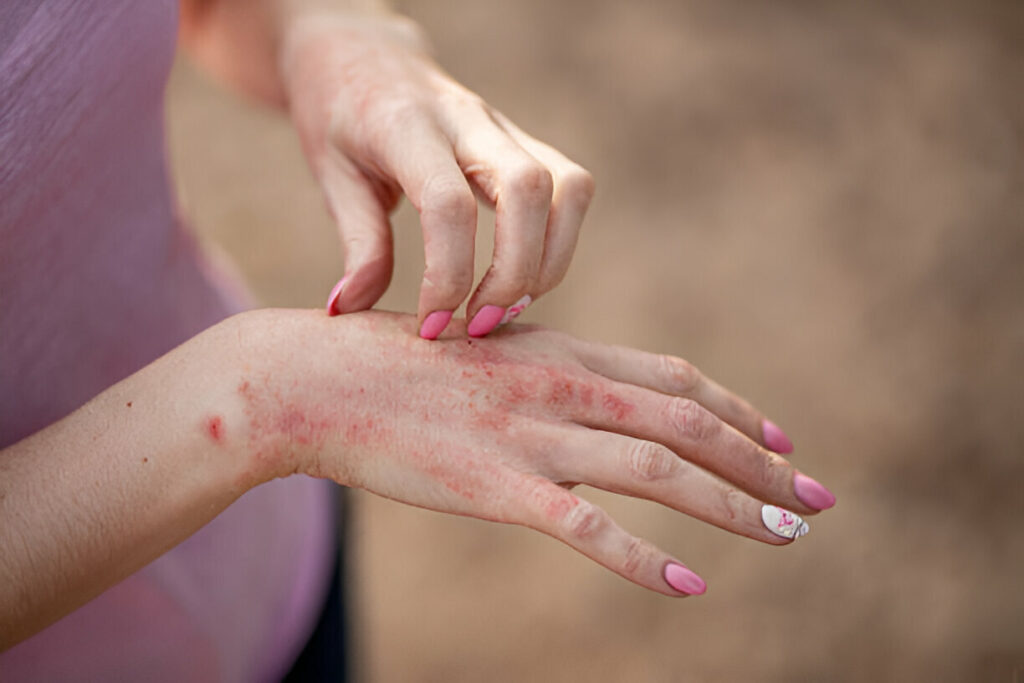108, Shangrila Arcade,
Nr. Shyamal Cross Road,
Satellite, Ahmedabad - 380015
Understanding Eczema: Causes, Symptoms, and Treatments
Introduction
Eczema, also known as atopic dermatitis, is a chronic skin condition that affects millions of people worldwide. Characterized by itchy, inflamed, and sometimes painful skin, eczema can significantly impact an individual’s quality of life. At New Touch Skin Clinic, we are dedicated to helping our patients manage this condition effectively. In this blog, we will explore the causes, symptoms, and treatment options for eczema.
What is Eczema?
Eczema is a term for a group of conditions that cause the skin to become red, itchy, and inflamed. The most common type is atopic dermatitis, which is often linked to other allergic conditions like asthma and hay fever.
Causes of Eczema
The exact cause of eczema is unknown, but it is believed to result from a combination of genetic and environmental factors. Common triggers include:
- Irritants: Soaps, detergents, shampoos, and disinfectants can cause flare-ups.
- Allergens: Dust mites, pet dander, pollen, and mold are common allergens that can trigger eczema.
- Microbes: Bacteria like Staphylococcus aureus, viruses, and certain fungi.
- Hot and Cold Temperatures: High or low humidity levels and sweating from heat can exacerbate eczema.
- Foods: Certain foods like dairy products, nuts, and seeds may trigger symptoms in some people.
- Stress: Emotional stress can aggravate eczema symptoms.
- Hormones: Hormonal changes, particularly in women, can trigger flare-ups.
Symptoms of Eczema
Eczema symptoms can vary from person to person but typically include:
- Dry, sensitive skin
- Intense itching
- Red, inflamed skin
- Recurring rash
- Dark-colored patches of skin
- Rough, leathery, or scaly patches of skin
- Oozing or crusting
- Swelling
Treatment Options
While there is no cure for eczema, various treatments can help manage the symptoms. Treatment plans are usually tailored to the individual’s needs and may include:
- Moisturizers: Regular use of emollients can help keep the skin hydrated and reduce flare-ups.
- Topical Steroids: These are commonly prescribed to reduce inflammation and itchiness.
- Antibiotics: If there is a bacterial infection, antibiotics may be necessary.
- Antihistamines: These can help relieve itching.
- Phototherapy: Exposure to ultraviolet light under medical supervision can be beneficial.
- Lifestyle Changes: Avoiding known triggers, managing stress, and maintaining a healthy diet can also help control symptoms.
Managing Eczema
Living with eczema requires a proactive approach to skincare. Here are some tips to help manage the condition:
- Bathe Properly: Use lukewarm water and mild, fragrance-free soap. Pat the skin dry and apply moisturizer immediately.
- Moisturize Frequently: Keep the skin hydrated with a good moisturizer, especially after bathing.
- Avoid Scratching: Keep nails short and wear gloves at night if necessary to prevent scratching.
- Wear Soft, Breathable Fabrics: Cotton clothing is often less irritating to the skin.
- Stay Cool: Avoid overheating and sweating, as this can trigger flare-ups.
- Reduce Stress: Practice stress-reducing techniques such as yoga, meditation, or deep breathing exercises.
To know more, follow this link: https://nationaleczema.org/eczema/
Conclusion
At New Touch Skin Clinic, we understand the challenges that come with managing eczema. Our team of specialists is here to provide you with personalized care and treatment plans to help you achieve healthier skin. If you are struggling with eczema, don’t hesitate to reach out to us for a consultation.
For more information, book an appointment!
- Best Full Body Whitening Treatment
- Full Body Lightening Treatment
- Best Laser Hair Removal Clinic
- Permanent laser hair removal
- Hair Removal in Ahmedabad
- Melasma Treatment
- Naturopathy Treatment for Alopecia Areata
- Full Body Brightening
- Skin Lightening & Whitening
- Carbon Laser Peel
- Hydrafacial Treatment
- Anti-Aging Treatment
- Hair Transplant
- Body Contouring
- Tattoo Removal
- Hair Loss Treatment
- Facial Treatment
- Acne & Scar Reduction
- Laser Hair Removal

For Best Treatment
Get ConsultationConsultation Fee: ₹1000/-
(Consultation fee will be waived if you avail any service or purchase any product.)


